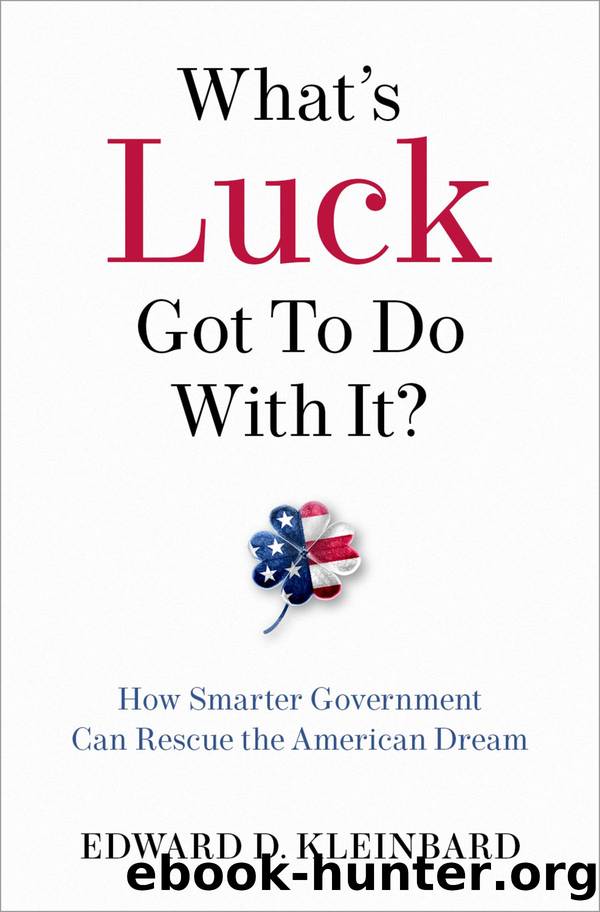What's Luck Got to Do with It? by Edward D. Kleinbard

Author:Edward D. Kleinbard
Language: eng
Format: epub
Publisher: Oxford University Press
Published: 2020-06-15T00:00:00+00:00
To effectuate these principles, all persons must have access to âprimary goods,â which Rawls defined as the goods needed by persons successfully to carry on life âas free and equal persons living a complete life.â8 Rawls specified these primary goods in some detail: they include the basic rights and liberties mentioned earlier (including freedom of thought and liberties of conscience, political freedom, and life under the rule of law);9 free choice of occupation against a background of diverse opportunities; the necessary social conditions for self-respect (âessential if citizens are to have a lively sense of their worth as persons and to be able to advance their ends with self-confidenceâ); and income and wealth sufficient âto achieve a wide range of ends whatever they may be.â
Rawls emphasized that his thought experiment contemplated a world of all cooperating with all as reasonable and rational individuals, rather than a war of all against all.10 In Rawlsâs construction, people are prepared to cooperate on fair terms if others will do so as well. They have self-interested reasons to want to cooperate, and a moral capacity to cooperate on terms that are fair (or reciprocal). To instantiate this, rational agents without knowledge of their principalsâ actual circumstances would propose institutions supporting a society that accorded first priority to the themes of equality and reciprocity of rights and obligations among that societyâs citizens.
Rawls contrasted his ideal of a society based on a fair system of social cooperation with its chief modern competitor, a society organized to produce the largest sum of individual utilities. (Utility here means some sort of agreed measure of well-being. In economics, money often is used as a shorthand metric for utility.) Utilitarianism does not promote equality and reciprocity as first-order goals around which society should be organized, but rather simply as instruments to be used insofar as they increase the measure of aggregate welfare.
The most controversial inference of Rawlsâs thought experiment is his difference principle, in which additional benefits cannot accrue to the better-off unless those arrangements primarily benefit the worst-off. Rawls basically saw the âworst-offâ here as the working class; the disabled, for example, require different considerations. And Rawls had no interest in applying his difference principle to those who could work but chose not to.
The difference principle is easily caricatured as requiring an early Soviet sort of social arrangement, in which all wealth creation is shoveled from industrious high-income workers to the undeserving poor, but Rawls did not mean it to be understood in quite that way. His idea was that rational agents working behind the veil could imagine many different ways in which society could organize the rules governing productive activity. He argued that, having no knowledge about the situation each principal would occupy in the real world, the disembodied agents would choose rules that gave the greatest return to the least-advantaged for any given return to the more-advantaged. âThe better endowed,â writes Rawls, âare encouraged to seek still further [personal] benefits . . . provided they train their
Download
This site does not store any files on its server. We only index and link to content provided by other sites. Please contact the content providers to delete copyright contents if any and email us, we'll remove relevant links or contents immediately.
International Integration of the Brazilian Economy by Elias C. Grivoyannis(107826)
The Radium Girls by Kate Moore(12012)
Turbulence by E. J. Noyes(8014)
Nudge - Improving Decisions about Health, Wealth, and Happiness by Thaler Sunstein(7689)
The Black Swan by Nassim Nicholas Taleb(7097)
Rich Dad Poor Dad by Robert T. Kiyosaki(6595)
Pioneering Portfolio Management by David F. Swensen(6280)
Man-made Catastrophes and Risk Information Concealment by Dmitry Chernov & Didier Sornette(6001)
Zero to One by Peter Thiel(5782)
Secrecy World by Jake Bernstein(4736)
Millionaire: The Philanderer, Gambler, and Duelist Who Invented Modern Finance by Janet Gleeson(4457)
The Age of Surveillance Capitalism by Shoshana Zuboff(4272)
Skin in the Game by Nassim Nicholas Taleb(4232)
The Money Culture by Michael Lewis(4186)
Bullshit Jobs by David Graeber(4176)
Skin in the Game: Hidden Asymmetries in Daily Life by Nassim Nicholas Taleb(3986)
The Dhandho Investor by Mohnish Pabrai(3750)
The Wisdom of Finance by Mihir Desai(3726)
Blockchain Basics by Daniel Drescher(3571)
